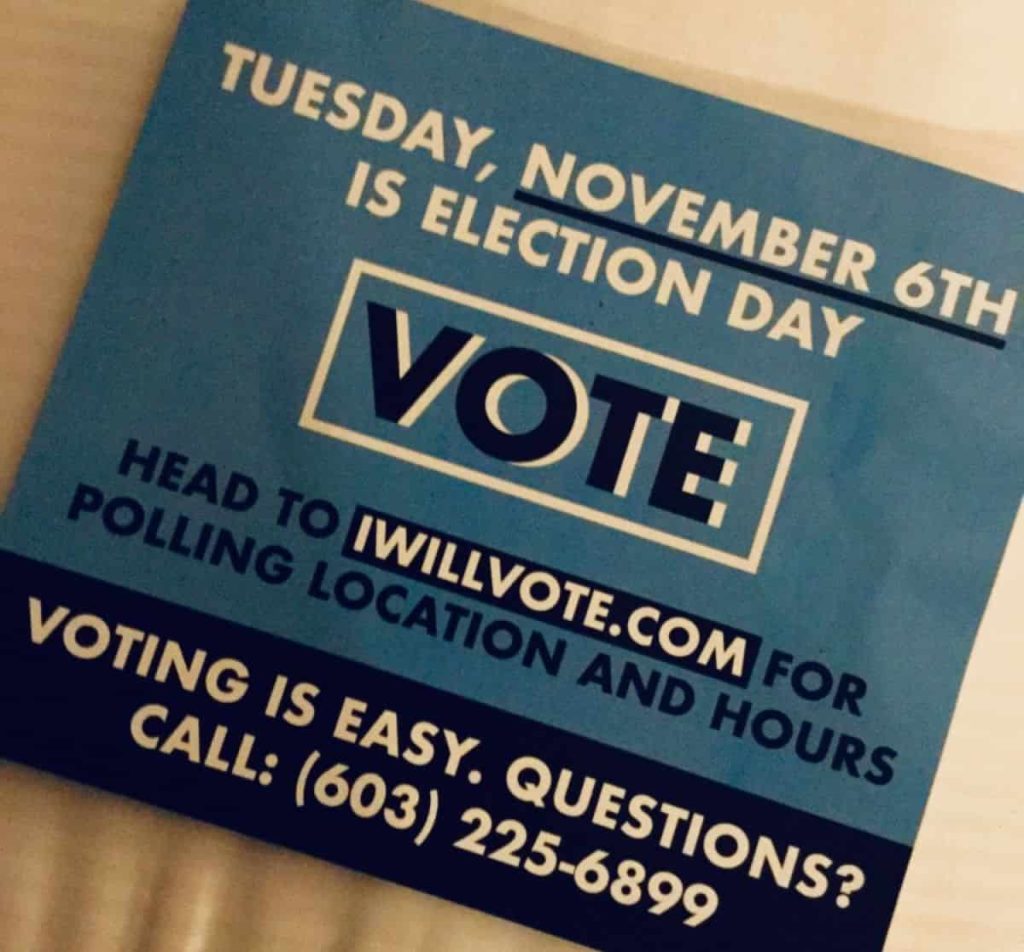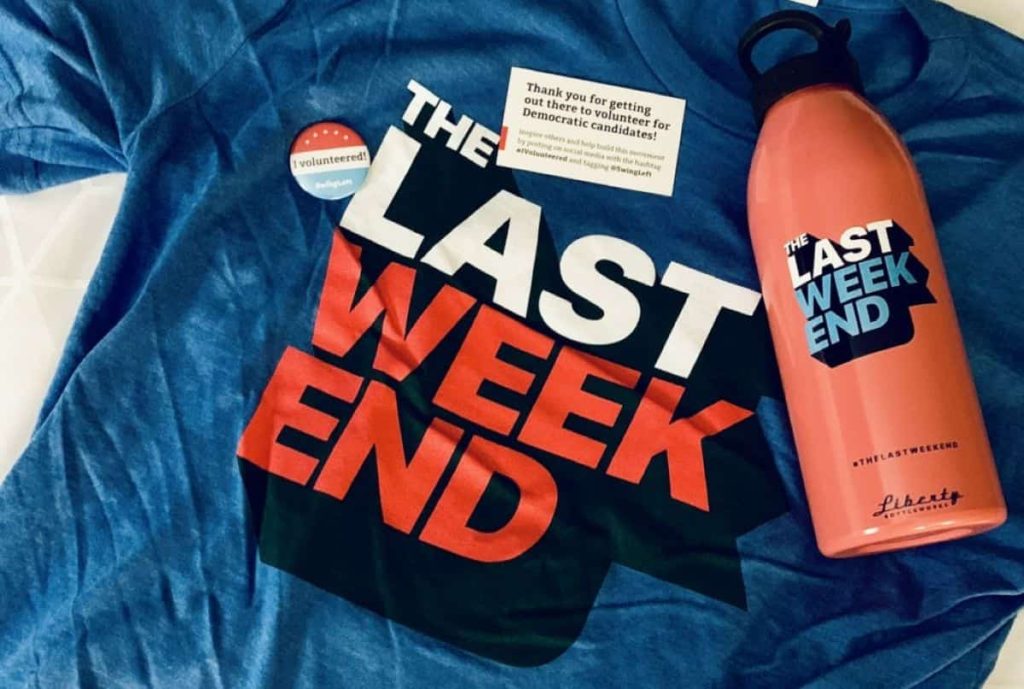I had big plans to save democracy this fall.
I would take off, leave my just-moved-into house behind. Walk away from the still unpacked boxes and tiresome sorting.
But then came life stuff: school visits, parents weekend, and more. My 30th wedding anniversary tucked into October and a trip to celebrate.
So was it too late? Would a check be better appreciated?
I decided I wasn’t too late. In fact, I was right on time.
Back in September, I had read about The Last Weekend, a catchy spin-off of Swing Left, a grassroots organization that connects eager volunteers with Democratic races nationwide.
The premise was simple: If you hadn’t been able to give your time or sweat during the months leading up to the crucial midterm election, maybe you could get on board for this last push in a “swing” district that could use fresh bodies?
That’s pretty much how I ended up in Manchester, New Hampshire, walking the streets and knocking on doors in the just-past-peak air of early November, stepping way out of my comfort zone to bother voters hustling to finish their weekend chores.
It felt scary at first, rewarding later, and tremendously satisfying when the results were tallied on Election Day and Congressional candidate Chris Pappas took home 53.5 percent of the vote, helping Democrats take back the House.
Not that I pushed anyone over the finish line. Still, it felt good. Even gratifying.
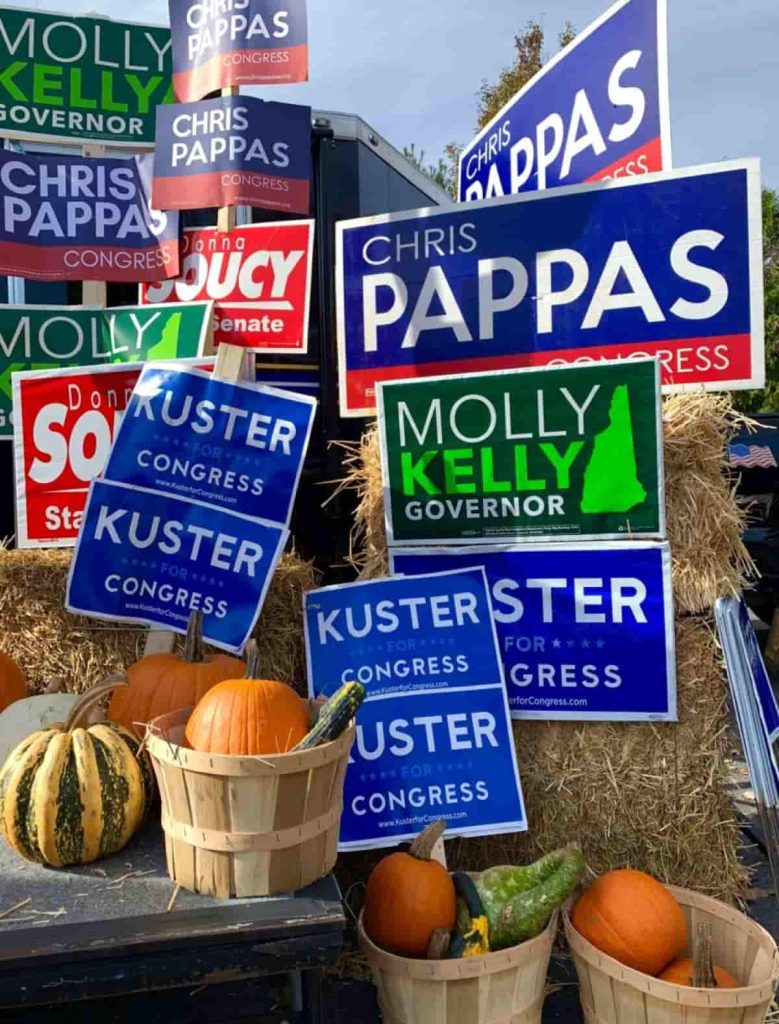
For me, The Last Weekend started in the basement of Teamsters Union Local 633 on a gray, drizzly Saturday.
(It has been twenty years since I lived in New Hampshire, and taking in the small group of mid-morning volunteers, I realized that I had misplaced my Granite State preparedness: I had forgotten my rain pants.)
The provisions were as basic as the setting: bottled water, Dunkin Donuts coffee, Utz potato chips. Decorations were in afterthought: some blue balloons and a few handmade hats created by stapling campaign leaflets together. And that was about it.
After signing in, we gathered in a small circle for our canvassing training. Our NH Democrats volunteer was upbeat and encouraging although she must have given these instructions hundreds of times.
A seasoned campaign worker, she reminded us to stay positive, to avoid dogs, to keep to the script, and to avoid political debates at all costs, no matter how biting the challenge.
Then, before sending us on our way, she choked up a little. My goodness did she look tired.
As a single volunteer, I was paired with another women, Sylvia, who had traveled up the highway from Lowell, Massachusetts. We picked up our maps and a few candidate pamphlets and headed for the door.
It was go time.
Our assigned area was the closely packed Manchester West Side. Settled at one time by French Canadians factory workers, the neighborhoods on our list today included mostly small capes and single-story homes.
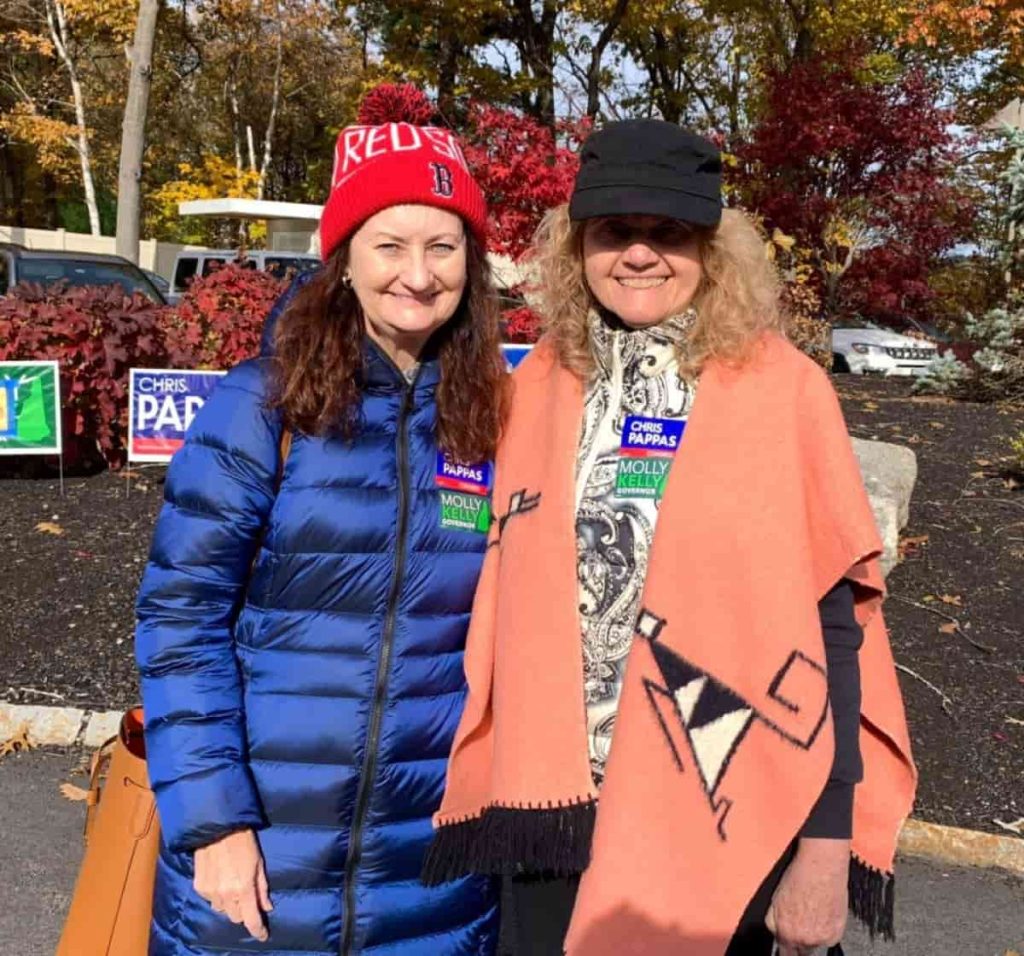
Sylvia, who grew up in Georgia, was both polite and thorough and I tried to copy her easy manner as we began canvassing. She took the lead until I got the hang of it.
Staying together for support, we approached the doorways as a unit, our script in hand. Would you be voting? Do you know how you’re getting to the polls? And so on.
(As an aside, the local New Hampshire Dems were considerably more chill than the young guns at Swing Left. I had participated in a web seminar a few days earlier and had been instructed to dispense with any ice breakers. For example, do not begin by asking, “May I have some of your time?” I was told.)
We needn’t have worried about mean dogs or slamming doors as we trudged through the wet, but still colorful autumn leaves of early November, stoops decorated with Halloween pumpkins just starting to turn soft and moldy.
Our job was to GOTV — Get Out the Vote — on this last weekend before the midterms. So we only marched up to friendly, Democratic voter homes — people likely to vote, but who, some campaign higher-up had decided, needed one last reminder.
Take, for example, the woman who had her two hyperactive dogs in hand before she opened the door. They pulled on her madly as she politely told us her voting plans were set.
Or the man shoveling wet leaves into his truck — a better way of doing it, he said, something about the density making the exhausting task more efficient — who politely stopped us before we could ask our questions to say he “was good.”
Or the new neighborhood resident with a deaf child, who popped her head out the door as we walked away to see if we needed water.
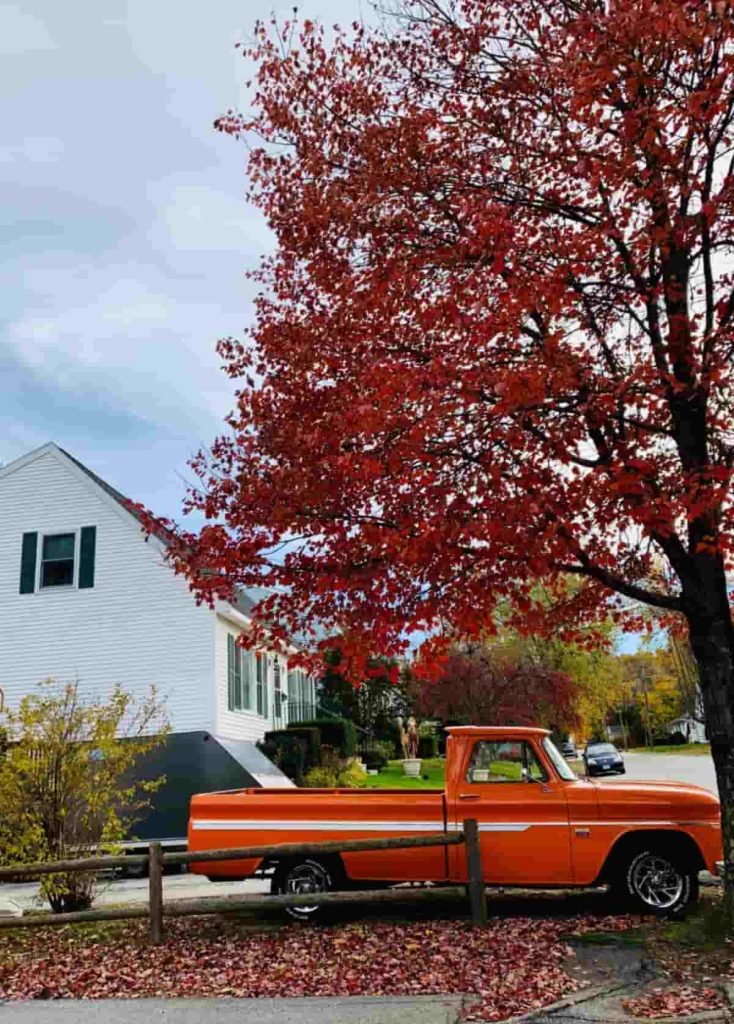
Maybe this is typical, but we did get one husband, an Independent voter, he declared, who filled in for his absent Democratic wife out doing errands.
He mildly opined on the do-good work President Donald Trump had accomplished: getting jobs going, boosting the economy, standing up to bad guys overseas.
(This was actually easier to take than I had expected because I couldn’t respond. It is a lot less pressure to listen when you don’t feel obliged to tear it all down in the end.)
Before we could politely break free, he pointed to the smooth roads leading to the nearby St. Anselm’s College, and the pitted, mess of street that made up his cul-de-sac.
(He was right. Fixing this neighborhood’s pot holes and would bring some dignity to these families and possibly change some minds.)
Roughly three hours later, we reported back to headquarters, giving a positive report of the dedicated at-home Saturday voters, handing in soggy and crumpled voting sheets. Sylvia and I agreed to go out again on Sunday afternoon following a scheduled rally planned by the candidates.
After a good night’s sleep at the Holiday Inn, I arrived the next morning to team up with Sheila, a former Army child now well into her 80s. Sheila had on a much-worn sweatshirt that read: Never trust an atom, they make up everything.
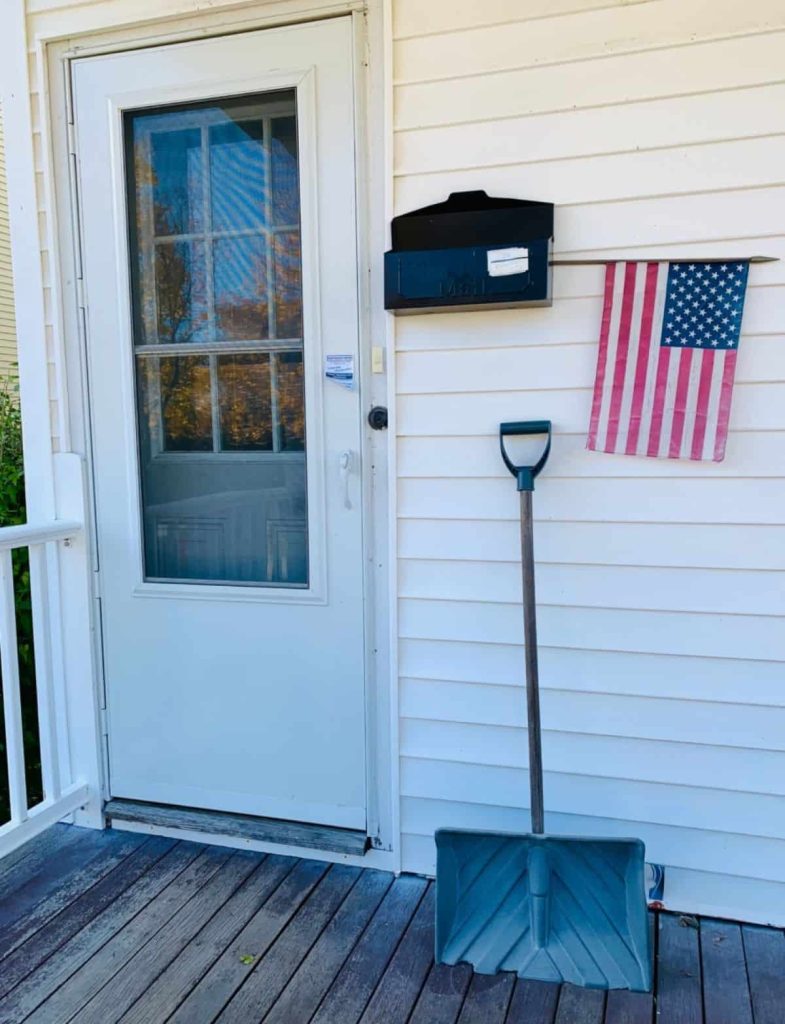
Sheila had spent part of her childhood in the South, married a loyal Granite State boy, and had likewise spent most of her life right here. She had a long history of canvassing, dating back to the Civil Rights era.
The years hadn’t softened her views. After one older women snorted that she would never vote for any “baby killer” Democrat, Sheila couldn’t let it go, ranting as she walked back to the street that if men had been equipped with a uterus, well you know, things would be different in so many ways.
On this sunny morning, we hit many old Manchester buildings sliced into many more apartments, their mailboxes all stuffed with campaign literature. (A big federal no-no, we had been instructed.) No one was home. Doorbells were broken or non-existent.
The one bright spot of the morning was a chance stop at a sidewalk yard sale of old video games, DVDs and other unrelated cast-offs.
The young woman selling her stuff told us she was in her 20s and had never voted. We told her she could register at the polls in New Hampshire, which I could tell she took into consideration. She even asked for pamphlets and smiled at us later on as we trudged fruitlessly through the old neighborhood of closed doors.
It was my favorite interaction of the weekend. I left thinking she just might do it.
In the afternoon, Sylvia and I were reunited and the reaction of voters was more pleasantly mixed. We were back walking the West Side neighborhoods, but this afternoon we were slightly distracted by the sunnier weather. We stopped to take a selfie with a blazing single red tree and to pocket a few gaudy leaves lining the uneven sidewalks.
I was a campaign volunteer and a leaf-peeping tourist rolled into one.
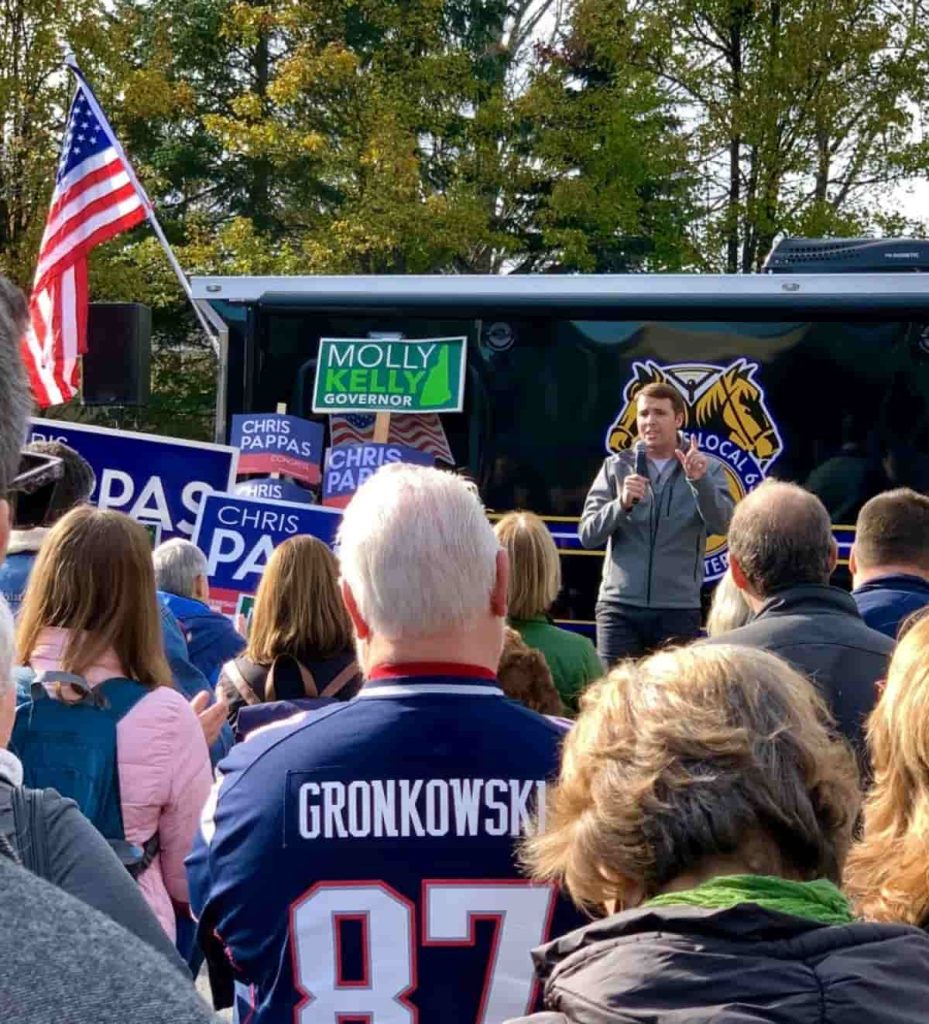
At an rally earlier in the day, Sylvia and I had gathered with other volunteers in the Teamsters parking lot to hear the candidates give a late campaign pep talk.
Chris Pappas, who three days later would become the first openly gay person elected to Congress from New Hampshire, spoke from the heart of the crossroads we faced as a nation and the all-out stakes of this election.
“We’re all going to be asked the question, years from now, what were we doing at this point in our history?” he told the small, supportive crowd. “What were we doing when our country needed us? What were we doing when our democracy was being undermined on a daily basis in Washington?
“Let’s have an answer for them. Let’s say we did everything we could.”
And it had felt good, even worthy in the end.
On to 2020.
